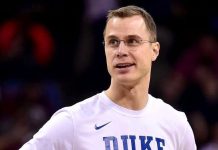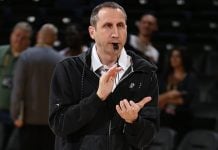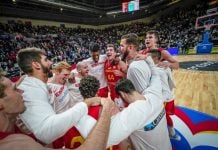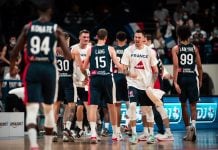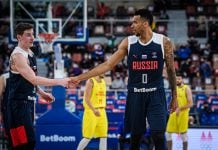The American-Israeli coach’s legacy crumbles as Russia fails to clinch second round at EuroBasket in Slovenia.
Russia’s worst post-Soviet basketball nightmare is over. Monday’s victory against Turkey wiped out the zero in the “wins” column, but still left Vasily Karasyov’s team rock-bottom sixth in Group D. Turkey and Sweden matched Russia’s 1-4 record and were also sent packing. Despite four defeats in a row and a string of Russia’s dismal performances in Koper, its fans turned up the volume Monday night in Bonifika Arena, cheering their team to first – and only – victory in the tournament. In a meaningless encounter Russia slammed the door in style as its budding prospects led by Cleveland Cavs rookie Sergei Karasyov indulged in a free-flowing game, hardly feeling any pressure.
The bitter pill may have been sweetened at the end, but Karasyov Sr.’s national team coaching debut ended in utter failure. One of the major reasons, as the 42-year-old acknowledged himself, was the squad’s inability to adapt swiftly to his coaching philosophy that puts an emphasis on transition offense, quick ball movement and the scoring touch of its sharpshooters.
Back-to-back losses against Italy, Greece and Sweden revealed cracks in the concept as Karasyov’s players simply couldn’t keep up the fast pace throughout 40 minutes and slumped every time they “ran out of gas.” Ahead of Russia’s fourth game against Finland Karasyov binned the run-and-gun tactics and opted to slow the pace down. The plan worked, but late in regulation Russia inexplicably squandered a five-point lead and eventually dropped a win that was its last ray of hope of advancing to second round.
Russia’s lowest EuroBasket finish in 20 years means that only basketball diplomacy can now save its bid to secure a 2014 World Cup berth when FIBA hands out four wild cards for the marquee event. Whatever the outcome, it is unclear whether Karasyov would remain at the helm of the national team. Though he stated unequivocally that he would not offer his resignation, the coach added he was ready to step down if his superiors deemed his work unsatisfactory. Post-tournament analysis of Russia’s performance in Slovenia reveals a number of weak links in the chain and the inexperienced head coach was definitely one of them.
In a wider context, though, Karasyov’s hasty appointment was a bigger error than his coaching mistakes. His name came up after Fotis Katsikaris, the man hired for the job last winter, abruptly quit in July under pressure from the new Russian Basketball Federation (RFB) management. His departure was portrayed as “voluntary,” though – as CSKA Moscow President Andrei Vatutin wrote Tuesday in his summary of Russia’s EuroBasket campaign on sports.ru website – “not only did Fotis Katsikaris’ sacking ahead of EuroBasket seem to discredit the image of Russian basketball, it also revealed the lack of basic understanding and disrespect for the national team’s preparation strategy.” In his statement, Vatutin insisted on the term “sacking”.
Later Tuesday, newly-elected RFB President Yulia Anikeyeva vehemently denied that Katsikaris had been sacked, asserting the Greek coach had jumped ship in the face of paramount challenges ahead of EuroBasket. That assertion is dubious, to say the least, considering Katsikaris’ competitive spirit and readiness to accept the challenge. Moreover, in June he quit his well-paid job at Bilbao Basket, the club where he enjoyed wide fan and management support, in order to clear a bureaucratic hurdle barring ACB coaches from coaching national teams. In his three years in the Basque country he guided the midtable outfit to Spanish league finals and a Euroleague debut, the club’s biggest success to date. Its remarkable run in the 2011/12 Euroleague season ended in quarterfinals. Having quit Bilbao, Katsikaris intended to focus on the Russian national team and the suggestion that he ran away defies logic.
Whatever the true reason behind his departure, the vacant spot was hurriedly filled by Karasyov, the man who guided Russia to victory at the 2013 Universiade in Kazan. Jumping in, he knew he had little time to rebuild the team that lost some of its biggest stars and eventually picked the wrong tactics – his team couldn’t run and shoot at breakneck speed for 40 minutes as he hoped it would, but he acknowledged that only when Russia’s slim chances of advancing into second round got even slimmer. To his credit, he didn’t shy away from claiming responsibility for the failure. However, RFB’s decision to hand the team tо a coach with only three years’ experience in the trade was questionable, to say the least. Karasyov at 42 is undoubtedly young and holds a lot of promise, but his three-year stint at Triumf Lyubertsy hardly qualified him for the top job in the country. And then – with all things being relative – how do you define young?
Greece’s Andrea Trinchieri, 45, started coaching youth teams at 18, got his first assistant job at 30, guided Cantu to Euroleague at 43, won Italian Supercup a year later and was named twice Italy’s coach of the year.
Italy’s Simone Pianigiani, 44, took up coaching at 26 and last season added a 16th trophy, Turkish Cup, to his collection of six Italian titles, five Cups and four Supercups. During his stretch at Montepaschi (2006-2012) he also led the Tuscan outfit twice to Euroleague Final Four.
Finland’s Henrik Dettmann, 55, started at 28 and took over Germany when he was 39. Four years later, his team clinched the semifinal at EuroBasket and in 2002 Germany won the bronze at the World Championship.
Turkey’s Bogdan Tanjevic, 66, debuted at 24. He was only 32 (!) when he won Euroleague (named Champions Cup back in the day) with Bosna Sarajevo in 1979. Two years later he guided Yugoslavia to a silver medal at EuroBasket.
Sweden’s Bradley Dean, 60, began to coach when he was 24.
Compared to them – and these are all men who sat on the opponents’ benches in Slovenia – Karasyov is a novice and the powers that be at RFB must have known that. They did know, actually, but they still went ahead with the appointment, doing a bad service to both Karasyov and his players.
On the floor, opponents exploited Russia’s weaknesses to the full, taking advantage of its lack of a safe pair of hands to handle the ball and a towering presence in the paint. In each of the four games it lost, the Russian team turned the ball over in double figures, “climaxing” against Sweden when its ball handlers erred 24 times. Many of those turnovers were committed through hasty plays as the team struggled to execute Karasyov’s fast-paced transition offense. The point guard position proved again to be the sore spot of this squad as its assists leader Alexei Shved (4.8 apg) had only 1.41 assist-to-turnover ratio (24/17).
Another key factor was the opponents’ dominance on the glass: in the four losses Vasily Karasyov’s men grabbed less boards every time they stepped on the floor, except in the double-overtime thriller against Finland that ended in a 52-52 rebounding tie. Russia ranked 19th of the 24 teams in rebounding and its overall tally would have been even lower had the Finland game not gone into overtime. The best illustration of Russia’s weakness in the air is the fact that its top rebounder was a guard, Vitaly Fridzon, who collected most boards (20) despite missing the last game against Turkey due to injury. The team’s nadir in the tournament, a 19-point blowout by Sweden in Game 3, emphasized Russia’s problems as the Scandinavians swept the glass – 44-31! But most of all Russia was hurt by its inconsistency as the team struggled to play in rhythm from tipoff to final buzzer.
Failed campaigns rarely breed hope, but Slovenia did provide a few glimpses into what could be Russia’s bright future if talented players continue to improve. 25-year-old Shved, swingman Karasyov Jr. (19), shooting guard Dmitry Kulagin (21), power forwards Semyon Antonov (24) and Yevgeny Valiyev (23) have at times shown they deserved the call-up. Blending their talent with the experience of longtime leaders will be the top challenge for Karasyov Sr. (or his potential replacement) in 2014. The major issue is how to find balance and whether Russia’s missing stars – at least some of them – will be returning next year. Without their input, the core of this new team will face a painful process of maturing and Russia’s major goal, a 2016 Olympics berth, could eventually remain just a dream.

